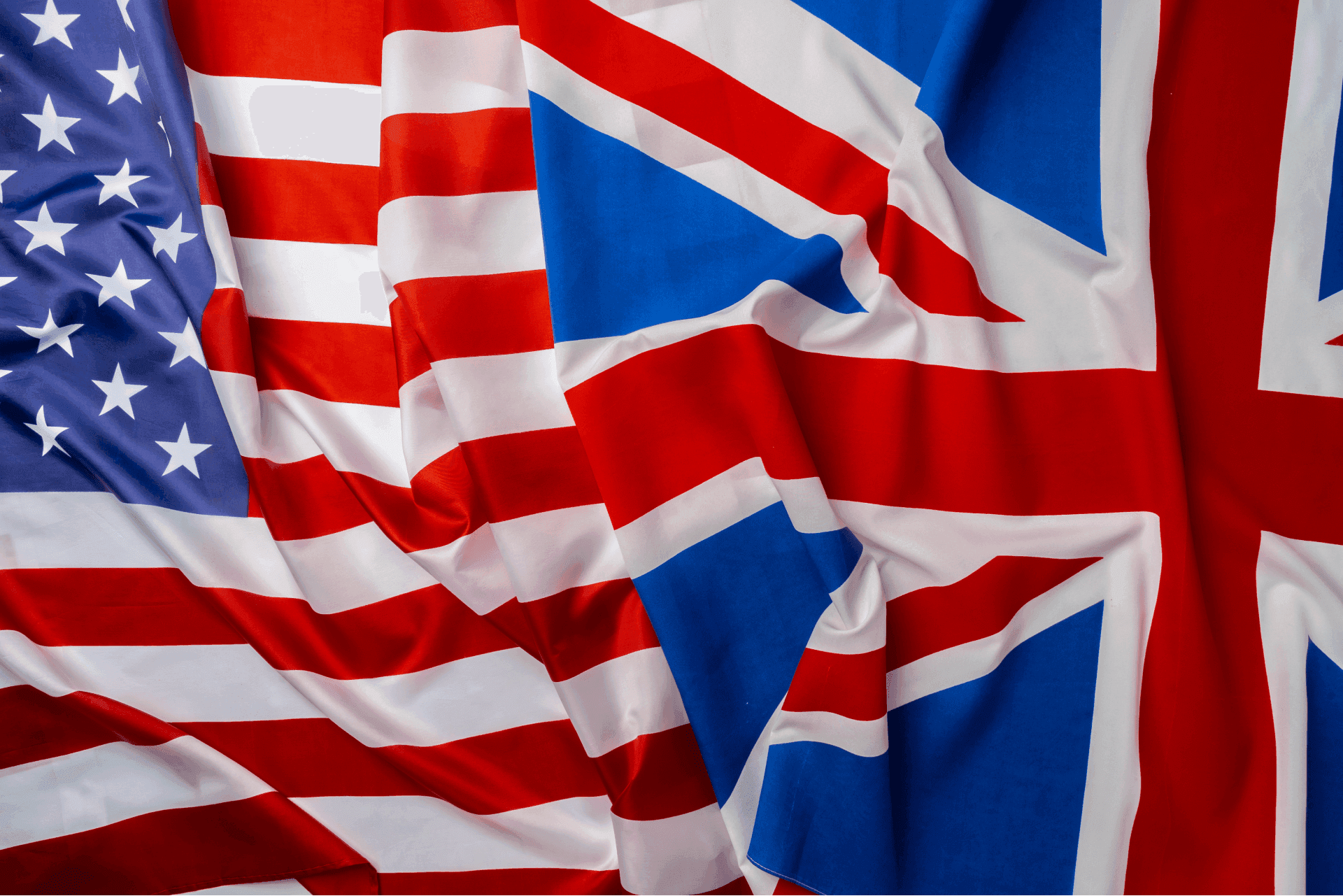According to Statista, in 2023, 1.5 billion people worldwide spoke English either natively or as a second language. The most popular tongue in the world is divided into two most notable versions, spanning from California to England.
Let's explore the main distinctions between British and American English. We'll cover spelling differences, variations in vocabulary, pronunciation, and more.
Why Do We Have American and British English?
Old English (450-1150 AD) was brought to the British Isles by Anglo-Saxons. It had strong influences from Norse languages because of the Viking invasions. The Norman Conquest in 1066 introduced many French words into English. Vocabulary and grammar evolved considerably during that time frame.
Early Modern English (1500-1800) was heavily influenced by Shakespeare and the King James Bible.
In the 1600s-1700s, British Colonists brought English to North America. On the new grounds, English was influenced by the Native American language, as well as Spanish, Dutch, and West African languages.
After American independence in 1776, the American identity was shaped, and the language evolved accordingly. Webster’s American Dictionary looked at standardizing the American English variant, noting differences such as ‘colour’ and ‘color,’ ‘aubergine’ and ‘eggplant.’
Why Learn about British and American English?
Most people who live in either of the two countries can distinguish between the American and British versions of English. The rest of the world can learn this information by comparing the two.
Who would benefit from mastering the difference between the two variations of English? Of course, travelers, students, people working in international teams, and anyone in contact with people across the ocean. If you're planning a trip to the US or the UK, knowing the nuances between American and British English will benefit you. One major advantage is smoothly communicating with the locals. Another one is avoiding confusion over vocabulary and pronunciation discrepancies. If you work for a global company, correctly using British and American English makes you sound more professional. Knowing how the two variants differ will also ensure your writing is consistent with one style.
British and American English - Pronunciation Differences

Pronunciation is one of the most obvious distinctions between British and American English. Words with (almost) identical spellings often sound different depending on the speaker's country.
Rhoticity. American English is mainly rhotic, meaning the r at the end of a word is pronounced. In most British English dialects, the r in that position is silent or non-rhotic. Example: car.
Vowel sounds. Words such as bath are pronounced as æ in American English and as a: by British people.
Zed or zee? When spelling names and words, ensure you’re using the right variation. Brits call the last letter in the alphabet zed, while Americans have been using zee since the 19th century.
British and American Spelling
Understanding spelling variations is essential, especially in academic and professional environments. Some words are spelled differently by a British person and an American. Many words can be grouped and memorized as part of this category. If you are interested in a particular field, for instance, medicine or education, you will benefit from taking notes on the main spelling differences in that particular field. Some of the most common ones are listed down below.
In a nutshell, American spelling usually uses fewer letters than its British counterpart (e.g., honor vs. honour), z instead of s for verbs (recognize vs. recognise), and -ter instead of -tre (theater vs. theatre). Generally, Americans tend to spell words the way they are spoken, while Brits are more connected to their linguistic heritage.
| British English | American English |
|---|---|
| ou vs o | |
| colour | color |
| labour | labor |
| behaviour | behavior |
| -s vs -z | |
| organise | organize |
| recognise | recognize |
| -tre vs -ter | |
| theatre | theater |
| centre | center |
| fibre | fiber |
| -logue vs non -log | |
| dialogue | dialog |
| catalogue | catalog |
| -que vs -ck | |
| cheque | check |
| -e vs -i | |
| artefact | artifact |
| c vs s | |
| licence | license |
| -mme vs -m | |
| programme | program |
| -l vs -ll | |
| fulfil | fulfill |
| -ll vs -l | |
| travelling | traveling |
| cancelled | canceled |
Vocabulary Variations in the English Language

English speakers living across the ocean will typically understand each other despite minor linguistic differences. American English speakers will easily understand British words, such as queue, rubbish, and lift. British people, in turn, are well aware of the American equivalents: line, garbage, and elevator, respectively. They share most words, and yet, some will vary.
| British English | American English |
|---|---|
| Fashion | |
| jumper | sweater |
| trousers | pants |
| trainers | sneakers |
| Transportation | |
| lorry | truck |
| trunk | boot |
| petrol | gas |
| motorway | highway |
| Food | |
| biscuits | cookies |
| crisps | chips |
| chips | fries |
| Babies | |
| nappy | diaper |
| dummy | pacifier |
| pram | stroller |
| Education | |
| form | grade |
| mark | grade |
| primary school | elementary school |
| Healthcare | |
| plaster | band-aid |
| GP | doctor |
| jab | shot |
| Other | |
| flat | apartment |
| car park | parking lot |
| bin | trash can |
| postcode | zip code |
| holiday | vacation |
| football | soccer |
Speak a new language with confidence!
Build fluency faster with FunEasyLearn — just 10 minutes a day is enough to make real progress.
American vs. British English Grammar
There aren’t many differences in how British and American speakers use grammar. Learning what sets the two apart will improve your English skills.
Collective Nouns.
Collective nouns are words that stand for a group of people, animals, or things. Examples include "family," "team," "group," and "pack." Whether you use a singular or plural verb with a collective noun depends on the variant of English you're using.
In American English, collective nouns are typically treated as singular. For example, you might hear, “The team is playing well.” This suggests that the team, as a whole, is playing well.
In British English, collective nouns are usually treated as plural, e.g "The team are playing well." This implies that each individual member of the team is playing well.
The Use of Tenses
The two variations of English use present perfect and past tenses differently. Speakers of British English tend to use the present perfect tense to talk about a past action that impacts the present. Americans prefer to use the simple past tense to convey the same idea.
Example:
| British English | American English |
| I have lost my keys. | I lost my keys. |
Past Simple and Present Perfect
Most verbs have the same past participle form in both British and American English. However, there are slight differences. Some verbs ending in n, m, and l have different past forms in the two variations of English:
| British English | American English |
|---|---|
| burnt | burned |
| dreamt | dreamed |
| smelt | smelled |
Another important difference is the past participle of the verb get. British English favors "got" in present perfect examples. However, American people prefer “gotten” in some cases. For example, you may hear "Have you got your umbrella?" in the U.K., but "Have you gotten your umbrella" in the U.S.
Punctuation Differences between British and American English

Punctuation conventions mark more differences between British and American English. The most notable ones are the use of quotation marks and the serial comma, which have a direct impact on meaning in written communication.
Quotation Marks. The main difference is that American English typically uses double quotation marks for direct speech and single marks for quotes within quotes.
Example: "Did he just say 'Hello'?"
British English commonly uses single quotation marks for direct speech and double quotation marks for quotes within quotes.
Example: 'Did he just say "Hello"?'
Serial Comma or the Oxford comma. One of the most debatable subjects among linguists - the Oxford comma - is ironically more present in American than British English. In other words, Americans are more likely to add a comma before the last item in a series.
Examples:
| British English | American English |
|---|---|
| He bought apples, oranges and pears. | He bought apples, oranges, and pears. |
| You can divide the number by 2, 4, and 12. | You can get two, four, or six chairs. |
Other differences between British and American English
Date format also varies between the two variants of English. Brits use a date-month-year format (30-4-2000). Americans prefer the month-day-year format (4-30-2000). Americans also put "the" before the date (February the 1st), which is not typical for British English.
In terms of abbreviations, British and American English follow slightly different conventions. American English includes periods in most cases. For example, "U.S." stands for the United States, whereas in British English, it’s written as "US," without periods. The same pattern extends to titles and professional abbreviations.
Examples:
| British English | American English |
|---|---|
| Mr | Mr. |
| Mrs | Mrs. |
| Dr | Dr. |
Learn any Language with FunEasyLearn
You can choose British or American English as your native language in the FunEasyLearn app. You can also improve either version before visiting the UK or the US.
Our app uses a game-based approach to learning, making learning fun and engaging. It also follows a logical progression of topics from simple to more complex. You start with the alphabet, then move on to words and sentences. The step-by-step approach helps you gain confidence one word at a time.
FunEasyLearn in numbers:
- 10 proficiency levels
- 34 language courses
- 62 native languages
- 11,000 illustrations
- 15,000 words, phrases, and expressions
- 300,000 audios recorded by native speakers
Summing Up
British English vs American English is not a popularity contest but a choice of which one to use at the right time. The two variations reflect their unique historical backgrounds. How people spoke on the two continents led to pronunciation, spelling, vocabulary, grammar, and punctuation differences.
Are you ready to join the millions of satisfied users
learning American English, British English, and 32 more languages?











